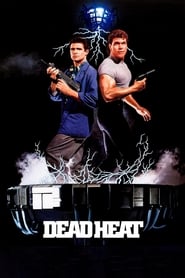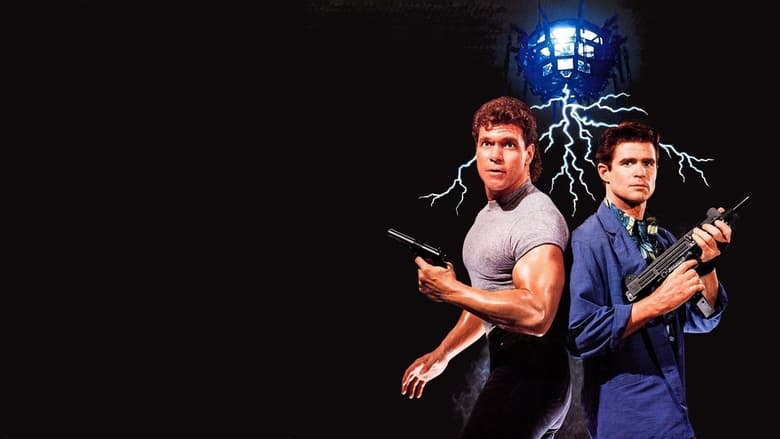“Dead Heat” is a sci-fi horror comedy film about two cops who are resurrected and become zombie detectives in order to solve a mysterious case involving immortal criminals. It’s like “Lethal Weapon” meets “Night of the Living Dead.” The movie is action-packed, hilarious and gruesome all at once. It’s a wild ride from beginning to end.

↓↓↓
Review
Dead Heat: Courage, Vulnerability, and Zombie Detectives
Have you ever watched a movie that made you laugh, cry, and think about life and death? A movie that blended humor, horror, action, drama, and romance with a meaningful message about courage and vulnerability? If not, let me introduce you to Dead Heat (1988), a cult classic directed by Mark Goldblatt and starring Treat Williams, Joe Piscopo, and Vincent Price. This article is not just a review or summary of the movie (which you can find elsewhere), but an exploration of its resonances with Brené Brown’s research on shame, empathy, authenticity, and resilience.
First of all, let’s recap the basic plot of Dead Heat. Roger Mortis (Williams) is a cop who gets killed while investigating a case involving stolen chemicals that can reanimate dead tissue. His partner Doug Bigelow (Piscopo) joins forces with him after he is brought back to life by the same chemicals. Together they pursue a gang of criminals who use the chemical to create an army of undead soldiers for their own evil purposes. Along the way they encounter various absurd situations and characters, such as a zombie horse racer (Darren McGavin), an undead dog trainer (Martha Quinn), and Price’s final film role as Arthur P. Loudermilk III, the eccentric owner of the company that made the chemical.
Now let’s dive into some themes and scenes that resonate with Brown’s work on vulnerability. One of her main insights is that vulnerability is not weakness but courage in action. To be vulnerable means to expose oneself to uncertainty, risk, emotional exposure, and possible failure or rejection. It also means to acknowledge our common humanity and interconnectedness with others. In Dead Heat we see Mortis becoming vulnerable in several ways: he risks his life to save innocent people from zombies; he admits his feelings for his former girlfriend (Lindsay Frost) and apologizes for neglecting her; he confronts his partner about his selfishness and lack of empathy; and he even accepts his own zombie status with humor and grace.
Another key aspect of vulnerability according to Brown is empathy, the ability to recognize and respond to the emotions of others. Empathy requires us to listen, observe, connect, understand, and validate without judgment or fixing. It also involves self-empathy, which means treating ourselves with kindness, curiosity, and compassion when we struggle or suffer. In Dead Heat we see both Mortis and Bigelow struggling with their zombie condition, but also trying to help each other cope with it. They share their fears, hopes, frustrations, and jokes about their new reality. They also extend empathy to other zombies they encounter, such as the horse racer who wants to die like a champion instead of being exploited by his greedy owner.
A third dimension of vulnerability that Brown highlights is authenticity, the practice of living from our true selves rather than from our masks or roles. Authenticity requires us to embrace our strengths and weaknesses, values and beliefs, passions and dreams. It also encourages us to express our emotions honestly and assertively while respecting others’ boundaries. In Dead Heat we see Mortis becoming more authentic as a result of his near-death experience. He becomes less cynical and more curious about the mysteries of life and death. He also becomes more playful with Bigelow as they try out their new zombie powers in creative ways (such as melting metal bars or reattaching severed limbs).
A fourth aspect of vulnerability that Brown examines is resilience, the capacity to bounce back from adversity stronger and wiser than before. Resilience involves cultivating positive emotions (such as gratitude), practicing self-care (such as sleep), seeking social support (such as friendship), fostering a growth mindset (such as learning), setting realistic goals (such as breaking a case), and finding meaning in suffering (such as honoring the dead). In Dead Heat we see Mortis and Bigelow needing all these elements to survive their mission and their zombiehood. They express gratitude for each other and their second chance at life. They take naps whenever they can to recharge their batteries. They rely on each other’s strengths to overcome obstacles. They learn from their mistakes and successes. And they honor the memories of those who died as they confront the villains who caused their deaths.
Overall, Dead Heat may seem like a silly or cheesy movie at first glance, but it has some deeper layers of meaning that resonate with Brené Brown’s research on vulnerability. The movie reminds us that courage, empathy, authenticity, and resilience are not just abstract concepts or ideals, but practices that we can cultivate in our daily lives even in the face of death and decay. The movie also shows us that humor can be a powerful tool for coping with pain and connecting with others. As Mortis says at one point: “You know what I think? I think life is like one long joke, with a punchline you never see coming till you’re flat on your back.”
To conclude, let me quote another line from Dead Heat that captures its spirit: “We’re undead and we’re proud!” Let us embrace our vulnerabilities, connect with each other, find joy in life’s absurdities, celebrate our differences, and honor our humanity even when it seems dead or dying. Let us be like Mortis and Bigelow, zombie detectives who embody some of the best traits of being human in a world that often denies them. Let us watch Dead Heat not just as a guilty pleasure or a forgotten gem, but as a tribute to the power of courage and vulnerability to turn death into life.
Technical Data

- Runtime : 86
- Release : 1988-05-06
- Genre : Action, Horror, Science Fiction, Thriller, Comedy
- Cast : Treat Williams as Det. Roger Mortis, Joe Piscopo as Det. Doug Bigelow, Lindsay Frost as Randi James, Darren McGavin as Dr. Ernest McNab, Vincent Price as Arthur P. Loudermilk
- Crew : Mark Goldblatt as Director, Ray Lykins as Stunts, Robert D. Yeoman as Director of Photography, Dan Bradley as Stunt Coordinator, Craig Stearns as Production Design
- Popularity 8.92
- Budget : $5,000,000
- Revenue : $3,588,626
- Company : New World Pictures, Helpern / Meltzer
- Summary : LAPD police officer, Roger Mortis is killed while arresting zombies who have been reanimated by the head of Dante Laboratories in order to carry out violent armed robberies.
- Tagline : You can’t keep a good cop dead.
